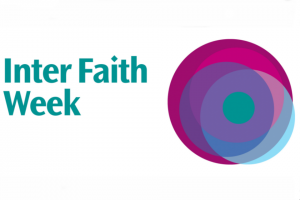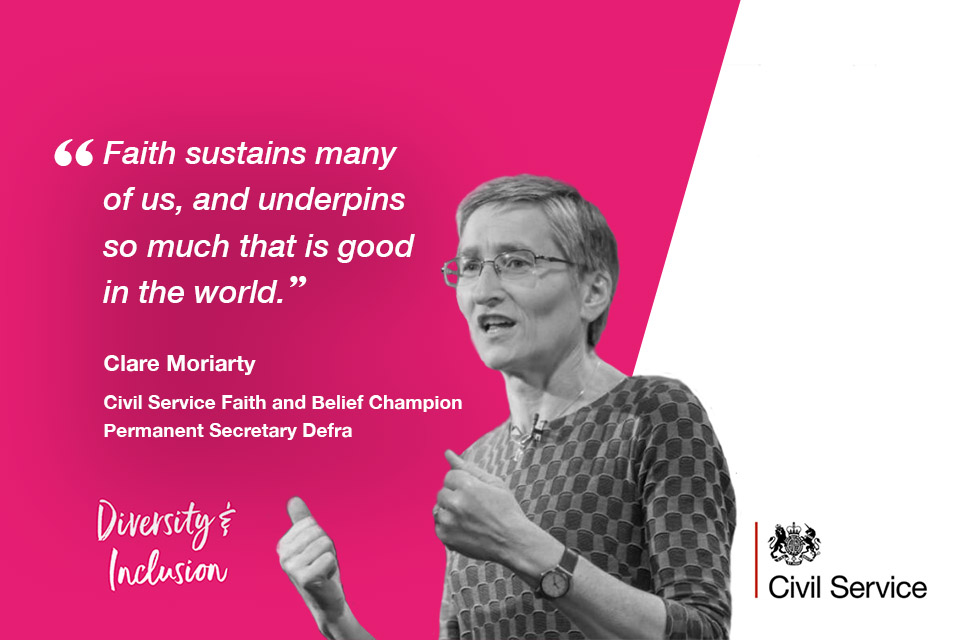
I blogged earlier this year about starting conversations around the practice of different faiths and belief systems as a way of getting into what can feel like tricky territory. Conversations need people to make them happen, so I have been building a network of departmental Faith & Belief Champions to help me by promoting faith literacy and inclusion in their departments.
The network met for the first time in July, and we discovered quickly that we are a diverse group. For a warm-up exercise, we silently sorted ourselves by length of time in the civil/public service, and found that the timeline stretched from new arrivals to those with over 30 years under our belts. As we began thinking about how we could work together, some common themes emerged. First was the need to set out simply how faith & belief fits into the wider picture of diversity and inclusion. We’ve now done that, and this will inform our future activity and messaging.
Another area we agreed on is the value of developing a toolkit that can be used by anyone interested in understanding more about faith and belief themselves, or sharing with colleagues. It’s clear that a lot of really useful material exists already, so it’s less about creating, more about making it easily available. Watch out for news on this soon.
 And then there’s the collective enthusiasm for ‘making some noise’ about faith and belief. For that, we’re focusing our efforts on Inter Faith Week (11-18 November), joining in with events taking place across the country involving people of all faiths and beliefs and none. Thanks to the efforts of departmental faith & belief networks, cross-government networks and departmental champions, a range of events are celebrating and building on the contribution that people of different faiths and beliefs make to the Civil Service and wider society.
And then there’s the collective enthusiasm for ‘making some noise’ about faith and belief. For that, we’re focusing our efforts on Inter Faith Week (11-18 November), joining in with events taking place across the country involving people of all faiths and beliefs and none. Thanks to the efforts of departmental faith & belief networks, cross-government networks and departmental champions, a range of events are celebrating and building on the contribution that people of different faiths and beliefs make to the Civil Service and wider society.
The events have a common theme of conversation, starting with the launch event on Monday 12 November, 'Let’s talk about faith and belief'. You can learn about Judaism in the Ministry of Housing, Communities & Local Government, Taoism in the Department for Work & Pensions, or the Sikh faith in the Environment Agency.
An interdepartmental event on Thursday 15 November will explore 'Faith in a crisis: are faith & belief groups the new first responders?' Alongside these events, a number of departments are taking the opportunity to launch faith and belief networks, and departmental champions will be blogging about their experience of faith and belief.

It’s no coincidence that Inter Faith Week coincides with the Armistice 100 celebrations. Each year it starts on Remembrance Sunday, highlighting the diversity of those who served in the two World Wars and in later conflicts. This year, we will particularly remember the soldiers who sacrificed their lives in the First World War. They came from the UK and from the countries that became the Commonwealth, from all faiths and beliefs and none. There are accounts of Muslim, Sikh, Hindu, Christian and Jewish soldiers fighting side by side, with their respective chaplains, rabbis and imams jointly taking care of the dead.
Among the many commemorations that will be taking place across the country, in a ceremony at the Guards’ Chapel on Wednesday 14 November we will remember the civil servants who gave their lives.
So, what do we want to achieve with this burst of activity?
 My hope is that a concentrated focus on faith and belief during Inter Faith Week will bring it firmly into the diversity and inclusion agenda, raise awareness and encourage people to be more confident talking about how they bring their faith or belief to work. So please do look out for events going on in your organisation, and get involved.
My hope is that a concentrated focus on faith and belief during Inter Faith Week will bring it firmly into the diversity and inclusion agenda, raise awareness and encourage people to be more confident talking about how they bring their faith or belief to work. So please do look out for events going on in your organisation, and get involved.
Inter Faith week events across government
-
Office for National Statistics: Talks on Judaism, Sikhism, Suffering & Injustice within Christianity, Atheism, Faith & Diversity; Scavenger hunt; Meat free Monday (vegan); Quiz; Secular meditation group. ONS internal events – information on ONS intranet
-
HM Treasury/Cabinet Office (CO)/Foreign & Commonwealth Office: Faith in a crisis: are faith and belief groups the new first responders?, Thursday 15th 1230-1330
-
HMT/CO: Faith and Belief Network launch event: 'Uncovering faith and belief' (Tuesday 13th); Interfaith lunch (Wednesday 14th); Monday 12th to Thursday 15th: Room available as a "reflection room" - to reflect, pray, or just take a few minutes out of a busy day for some peace and quiet. HMT/CO internal – information on departmental intranets
-
Home Office: Border Force Interfaith week event, Wednesday 14th, 0930-1630, Portsmouth
-
Department for Education: Inter Faith open discussion, Wednesday 14th, 1145-1245. DfE internal event – information on DfE intranet
-
Department for Transport: Faith in the Workplace talk, Thursday 15th, 1245-1400. DfT internal event – information on DfT intranet
-
Department for Environment, Food & Rural Affairs Group: EA Sikh Fellowship webinars, Monday 12th and Wednesday 14th; 'Faith and Belief: A Defra Group Conversation' event with Clare Moriarty and Tamara Finkelstein, Thursday 15th 1230-1330, London. Internal events – more information on Defra intranet
-
Ministry of Housing, Communities & Local Government: Clive Lawton on Judaism, Tuesday 13th, 1400-1500

8 comments
Comment by Claire posted on
As an individual who strongly believes there is no deity or other supra-natural guiding force and that we are all responsible to each other for being decent human beings, I find the intrusion of religion and belief into the work place rather puzzling. Especially as these topics have proved to be among the main drivers of conflict and hatred throughout history.
What's it meant to achieve?
Comment by Kirsten Stott posted on
Hi - I am seeking information on any Civil Service faith groups or forums that may exist, without much success. I have only managed to find links to the blogs here (which have been good to read).
I am on quite a faith journey at the moment, and am struggling a little with being two people - the 'Work' Me and the 'Christian' Me.
I am sure I cannot be the only person to feel in a tizz with this, so wonder if anybody knows of any useful places I can 'virtually' go to when things get tough?
Sorry if this does not make much sense!
Any advice would be gratefully received.
Comment by Faith posted on
I have some questions:
- Why is faith, interfaith dialogue, and promotion of faith networks being promoted so much in the civil service, is this decision based on any studies, evidence of value, assumptions or indeed faith?
- Does having separate networks for separate faiths promote integration or segregation?
- Is there any evidence that increasing activity of faith groups within work places increases integration?
- Given the fact that different faiths may involve the belief that theirs is the right way, which may or may not be openly discussed or acknowledged in 'interfaith' forums, do you think it would be better to focus on shared values that we can all have regardless of faith. For example, values focused around humanity and compassion?
Comment by Stu H posted on
How unfortunate that - in the first year that Humanists have been invited to take part in the Remembrance Day Service - that they are not listed along with the "Muslim, Sikh, Hindu, Christian and Jewish soldiers fighting side by side".
Sadly, it reinforces the fact that the terminology still seems to be "faith and belief", rather than "Religion OR Belief", which is the preferred term, the term used in all legislation, and makes far clearer that religious faith is not the sole driver for philosophical stances.
Comment by Clare Moriarty posted on
Thank you for pointing this out. And my apologies for not referencing Humanists. I had the benefit of a great teach-in from Roger Hutton on non-faith belief and the role that Humanism plays in the armed forces, in particular, so should have remembered to include them specifically.
An earlier blog prompted some lively debate about terminology and I’m aware of different views on this. We are using ‘faith & belief’ for consistency but, as I hope I’ve made clear in this blog and elsewhere, the discussions which we’re trying to promote need to encompass all aspects of faith, religion, belief and non-belief.
Comment by Stu H posted on
To my knowledge, there has been no explanation as to why the legally accepted term of "religion or belief" has been dispensed with. In all honesty - and I hesitate to say it - it carries the appearance of a change made as a personal choice, as a reflection of personal beliefs - which does not seem appropriate for a role that should support ALL religions and beliefs.
If there is a particular reason for the legally recognised term NOT to be used, I would be interested to hear it. Was there any consultation with the existing religion or belief networks across the Civil Service, some of which (as is the case with my Department) have been in place for many years now?
Comment by Civil Service Diversity and Inclusion Strategy Unit posted on
Hi Stu,
We liaised with a range of cross-departmental faith and belief champions and networks from across the Civil Service to develop and agree the language. Please be assured that Humanist networks were involved and their feedback was incorporated into the final version of the narrative which we have developed. This was a fully consultative process.
We are working hard to promote language that is inclusive and encompassing all aspects of faith, religion, and non-belief.
Comment by Stu H posted on
Why change from the legally recognised usage of Religion or Belief?
So far as my Department goes, I recall no consultation with our RoB Network, nor with our Humanist group.